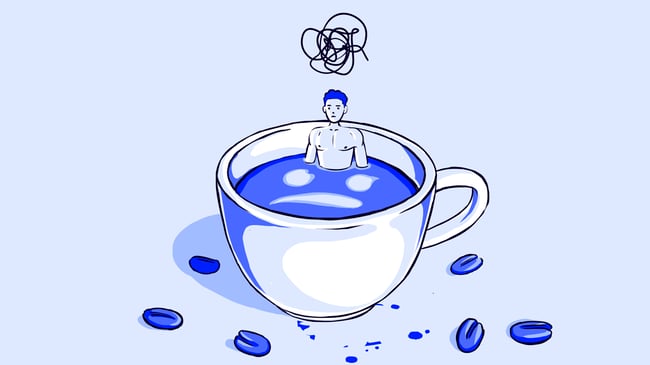

I used to think I drank a lot of coffee. A cup of French press in the morning. An espresso at work. Perhaps an extravagant, fancy order at a cafe later in the day, finishing the afternoon with a large amount of tea. Then I moved from the UK to the Pacific Northwest, home of the coffee shop, where I learned that among the ranks of North American coffee-drinkers, I was what you might call a babyccino. My European ways called for the appropriate coffee at a select time, and certainly nothing after six pm. Here, there was no wrong time for caffeine, and no cup was ever too strong.
The first caramelized, dark roasted months in my new country were spent in a state of perpetual buzz. I’d put away a pot or more of drip coffee each morning, then happily sip through the evening in a quiet corner, before downing Red Eyes in a diner at night. My local French-Canadian coffee shop commenced my order as soon as they saw me walk in—but I wasn’t some proud coffee snob, either. I wouldn’t turn down a cup of instant. In fact, I wouldn’t turn down anything coffee-related: ice cream, cake, artisan porter. And every birthday and Christmas brought some new bean-related gadget or brewing device to try and fit into my overcrowded kitchen cupboards.
Since then, caffeine has arguably been one of the great loves of my life (I’m adding ‘arguably’ on the off-chance my partner reads this piece). It’s helped me to bash out articles on a deadline, socialize through coffee shop culture, and explore my city by checking off cafes, bakeries, and roasteries from my ‘to visit’ list. But that’s not to say that everything has been frothy and syrupy-sweet between me and my favourite drink. Our relationship has definitely had its percolations. At times it’s become overheated to the point of bitterness—so much so, that caffeine and I have been on a break for the past couple of months.
Lockdown was a great opportunity to spend some time apart from coffee, to play the field with other hot beverages. It hasn’t been easy, but I’ve now been caffeine-free for over ten weeks, and my abstinence has allowed me to see the effects of my habit a little more clearly.
Masking exhaustion
Only when I cut out caffeine completely did I realize just how tired I’d been making myself. After a particularly intense stretch of caffeination—maybe a week or more of jitters and coffee breath—I would often enter a slightly surreal state, where rooms seemed constructed upon my opening the door, or people’s faces whirled together just in time for me to see them. As it turns out, this is what doctors and the internet call exhaustion.
During some Googling to make sure that I wasn’t about to fall into a post-caffeine coma, I came across this study by scientists from Brazil and the UK, who were monitoring the endurance of some highly caffeinated cyclists. They found that caffeine significantly improved the cyclist’s stamina, but only because it was reducing the perception of effort, not effort itself (specifically, neuromuscular fatigue.) In other words, caffeine had been cross-wiring my brain on a level normally only attributed to hard drugs—putting how I felt directly at odds with the true state of my body.
Coffee comedowns
As a reformed caffeine addict, I now wander the post-lockdown streets, peering through the windows of my old, emptied haunts, sipping from a vat of camomile or Moroccan mint as I worry about their chances of reopening. I’ve been chastised more than once for shoving my masked nose into another’s freshly made pour-over and interrogating them on flavour profiles. And a look at my YouTube search history reveals a stalker-y level of interest in brand reviews and brewing how-to’s..
It’s made me think about the way coffee so quickly turned into a cornerstone of my routine. Once removed, other, seemingly unrelated things became unstable: a drop in work efficiency and energy; a decline in mood. All classic signs of a person becoming dependent on an external substance or influence.
I already knew I was sort of addicted to caffeine—but was I addicted addicted? The capital A sort of addiction that requires real self reflection and serious work? The science seems to say: maybe. A quote in a 2018 review of literature from the Journal of Risk Management struck a chord with me. “With such a short half-life, caffeine deprivation occurs each night for regular coffee users.” I’ve definitely felt that daily comedown, yet have never really given it serious attention. Being honest, I now see it’s bad news for my mood, and the beginning of another day of caffeine craving.
I already know that I won’t stay caffeine-free forever—heck, it’s hard to write this without putting on a fresh pot. But the last few weeks have been a valuable wake-up call. It’s taught me that coffee is a real and powerful stimulant, and if nothing else, deserves some conscious recognition. In fact, I’d now recommend the same process for everyone. Whether it’s coffee, alcohol, cigarettes, or some other socially acceptable drug, give yourself the chance to step back from your daily habits, pay attention to your mood and perspective, and see if a connection emerges.